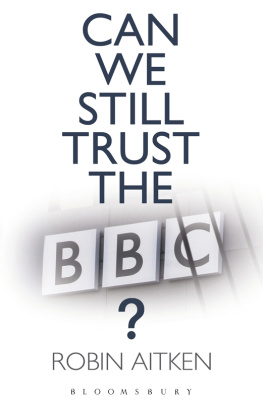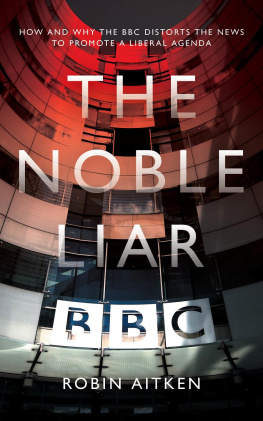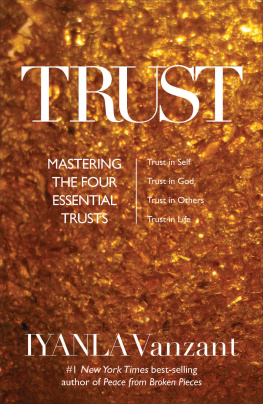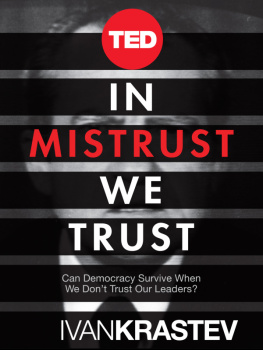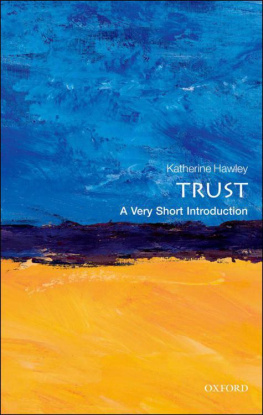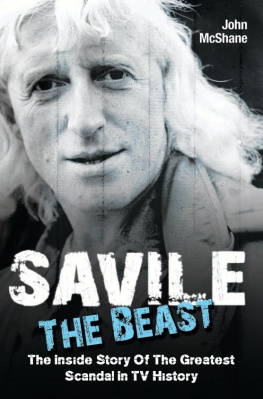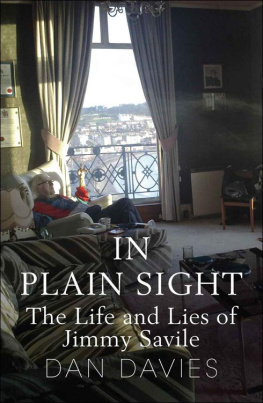Can We Still
Trust the
BBC?
ROBIN AITKEN

First published in Great Britain 2013
Copyright Robin Aitken, 2013
The moral right of the author has been asserted
No part of this book may be used or reproduced in any manner whatsoever without written permission from the Publisher except in the case of brief quotations embodied in critical articles or reviews. Every reasonable effort has been made to trace copyright holders of material reproduced in this book, but if any have been inadvertently overlooked the Publishers would be glad to hear from them.
A Continuum book
Bloomsbury Publishing Plc
50 Bedford Square
London WC1B 3DP
www.bloomsbury.com
Bloomsbury Publishing, London, New Delhi, New York and Sydney
A CIP record for this book is available from the British Library.
ISBN 9781472900906
10 9 8 7 6 5 4 3 2 1
Typeset by Fakenham Prepress Solutions, Fakenham, Norfolk NR21 8NN
Contents
Thank you to all those who helped
me research this book.
And especial thanks to my wife Sarah
for her constant support.
BBC NI | BBC Northern Ireland |
CFFC | Catholics for a Free Choice |
CPS | Centre for Policy Studies |
EEC | European Economic Community |
IPPF | International Planned Parenthood Federation |
IRD | Information Research Department (Foreign Office) |
NGOs | Non-governmental organizations |
TVE | Television Trust for the Environment |
TWTW | The World this Weekend |
UNAIDS | United Nations AIDS programme |
UNFPA | United Nations Fund for Population Activities |
WATO | The World at One |
WMD | Weapons of Mass Destruction |
Any author who writes a book which poses a question in its title risks getting an answer they didnt particularly want to hear. So it was when I wrote and had published my original book Can We Trust the BBC? in 2007. The BBC itself comprehensively ignored it. After a short flurry of interest, things went very quiet and I concluded that the answer to the question was clear enough; Yes, most people did trust the BBC. My strictures were of little or no concern to the majority. The BBC sailed on majestically, still the most important news source of the nation, still its favourite entertainer, and still overwhelmingly, the most important cultural institution in Britain.
In the years following publication I reviewed my own position and decided that I should move on: I had had my say, given my honest opinion but few people seemed interested and no grand debate had ensued. I decided it was time to get on with life. I didnt want to become obsessive about the BBC (some friends had gently intimated that perhaps this point had already been reached). Nothing more embarrassing than a man riding his hobby horse in a theatre the audience has vacated. And so, disappointed and somewhat sadder and wiser, I turned to other matters: I remained a more than averagely interested spectator in matters BBC but I relegated it to the mental drawer marked historic interest.
But my book turned out to have an unexpected afterlife. In 2012 I was contacted by several BBC people once to take part in Radio 4s The Moral Maze to talk about public service broadcasting and once to give evidence to an internal inquiry into impartiality. It seemed that, after all, not all my criticisms had been had been dismissed out of hand.
And then, in the autumn of 2012, the BBC found itself embroiled in fierce controversy and the thought occurred that some purpose might be served by revisiting the subject. I do so with trepidation but what gives me some confidence that the exercise is not entirely without merit is that this time I am writing against a background where the BBCs reputation and standing and the trust that the audience places in it suddenly loom much larger in the public debate. We cannot foretell, at this juncture, what consequence the various scandals will have but I think even at this stage of the drama when we have, as it were, had Act 1 and are awaiting Acts 2 and 3 that the BBC will not emerge unscathed. Public trust has been jeopardized and in ways that I, for one, never foresaw. For who would have predicted that of all things it would be a sex scandal that rocked the foundations at Broadcasting House?
It is the question of trust that lies at the core of the current crisis. The Corporation has been quite explicit about the central importance of trust stating that its aim is to become the most trusted broadcaster in the world. Indeed by many reckonings the BBC has already achieved this lofty ambition. More people listen and watch more BBC output around the world than can be claimed by any other broadcaster; what is more this output is held in high regard by most of the audience. The BBC is the greatest cultural export of the modern British nation. So the question which must now be exercising the Corporations top managers is whether the current scandals are likely permanently to damage that trust or is this a little local difficulty which will fade with the passage of time leaving little trace? Furthermore if trust has been damaged how can it best be restored?
The justification for this book is that in some way it clarifies and aids what is a crucial debate both for the BBC and for us, its audience and paymasters. No one who cares anything about the BBC should be indifferent to this. My aim is to put the current problems at the BBC in some context. I will endeavour to explain how the BBC got to where it is. My original book concentrated on the lapses and shortcomings of the BBCs doctrine of impartiality. It was heavily infused by my own belief that certain strands of opinion, certain groups, do not get a fair hearing from the BBC. In the light of current developments that might seem a somewhat quaint, even irrelevant side-issue. But it remains an important I would argue the most important question in relation to trust in the BBC. In that first book I criticised the way the BBC reported some of the major issues and stories of the past three decades. Most of this material is included in this book but I have excised some which no longer seems relevant or has been overtaken by events. In addition I have included at the end of each chapter short contemporary appraisals of how things have changed, in my opinion, since the book first appeared. For change there has been and the BBC now, in my view, does a somewhat better job of representing a broader range of opinion.
Here I must enter a caveat. Proving bias, or lack of even-handedness on the part of a broadcaster is a task that is not amenable to statistical analysis. Hard facts and figures are almost impossible to come by. Proof in the sense that a mathematician or scientist would understand the term is not available to us. The subject relies on impressionistic judgements which will always be open to dispute; the reader may object that personal judgement, anecdote and hearsay are a poor substitute for facts and figures. I agree but unfortunately it is, mostly, all that are available.
In the conclusion to this book I will attempt to draw some of the strands together and look to the future. The BBC is not in existential crisis: we will not awake tomorrow to find it disappeared from the scene. It will continue to play a leading role in national life. But it has been damaged. The task for it now is to react constructively to the problems that have come to light. There has to be some process of renewal but this is a permanent task facing every human institution. And that sage advice never waste a good crisis is especially pertinent in this case. The Corporation has just appointed a new Director General a man who, providentially, seems in possession of a rare range of qualities. All his skill will be needed to restore confidence and stability to an organization deeply troubled by recent revelations. However if the BBC can emerge, humbled probably, but determined to regain its lost good name then its current travails might even be put to good use.

